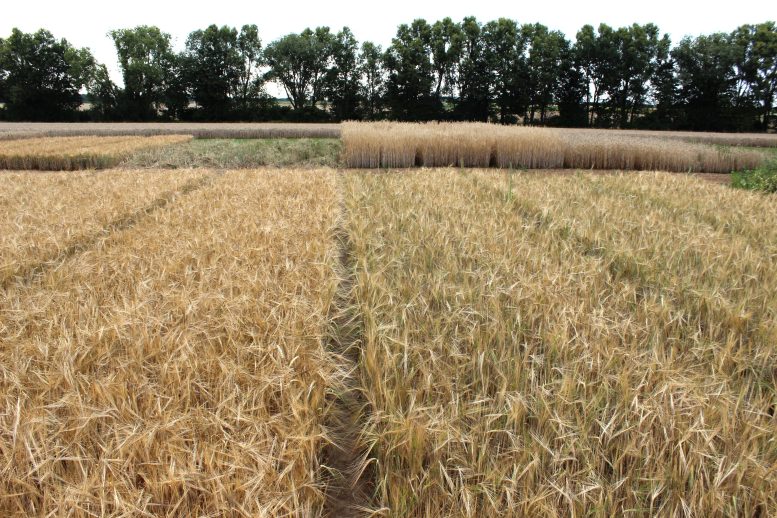
A research project conducted at the University of Bonn reveals differences in the growth of plants under organic and conventional farming methods.
A long-term study at the University of Bonn has shown that plants can genetically adapt to the specific conditions of organic farming. In the study, researchers cultivated barley on two adjacent fields, employing conventional farming techniques on one and organic practices on the other.
Over the course of more than 20 years, the organic barley was enriched with specific genetic material that differed from the comparative culture. Among other things, the results demonstrate how important it is to cultivate varieties, especially for organic farming. The results have now been published in the journal Agronomy for Sustainable Development.
At the end of the 1990s, Prof. Dr. Jens Léon started an experiment at the University of Bonn that he knew would run for a long period of time. His research group wanted to investigate the effects that farming conditions have on genetic material in plants. To this end, they carried out a complex long-term study over a period of 23 years at the Institute of Crop Science and Resource Conservation (INRES). “We first crossed high-yield barley with a wild form to increase genetic variation,” says Léon. “We then planted these populations on two neighboring fields so that the barley grew in the same soil and under the same climatic conditions.”

The only difference was the farming method. Conventional farming was used in one of the fields where the researchers used pesticides to combat pests, chemical agents to eliminate weeds, and mineral fertilizers to help ensure a good supply of nutrients. The researchers took a more ecological sound approach in the other field: no pesticides, combating weeds using mechanical methods, and fertilizing the soil with manure from stables
Some of the grains were retained every fall to sow the fields the following spring – using the organic grains on the organic field and the barley grown under conventional conditions on the comparative field. “We didn’t choose the grains based on any particular characteristics, however, but simply selected a small part of the harvest at random,” emphasizes Léon’s colleague Dr. Michael Schneider.
Analyzing genome development in time-lapse
The researchers also analyzed the genomes of the conventionally and organically farmed plants on a yearly basis. Every single gene can exist in a variety of different forms called alleles. For example, the human gene responsible for eye color exists in the alleles “brown” and “blue.” The frequency with which certain alleles arise in a population can change over generations. Environmental conditions are one factor that plays a role in this process: Alleles that ensure plants thrive in their current environment are usually found more and more frequently.
The researchers identified two interesting trends in their genetic tests: In the first twelve years, the allele frequency in the barley changed in the same way on both fields. “Our interpretation of this finding is that the very diverse populations caused by a cross with wild barley were adapting to the local conditions,” says Dr. Agim Ballvora, who also participated in the study.
“After all, factors such as the climate, soil, and especially length of day were identical for both populations.” However, the allele frequencies of both cultures diverged increasingly in subsequent years. In particular, the barley grown using organic farming methods developed gene variants that were less sensitive to a nutrient deficit or lack of water – i.e., alleles that influenced the structure of the roots. “One reason for this is presumably the strong variations in the availability of nutrients in organic farming,” says Léon.
Genetic heterogeneity facilitates the adaptation process
The conventionally farmed barley also became more genetically uniform over time, meaning that the genetic material in the individual plants grown on the field became more and more similar from year to year. However, the organic barley remained more heterogeneous. The allele frequencies of the organic culture also varied more widely over time. This resulted in some years being extremely favorable or unfavorable for some alleles.
This could be because the environmental conditions fluctuate much more in organic farming than with conventional framing methods: If certain plant diseases take hold in one year, for example, the plants will rely most on those alleles that will protect them. The variability of the environmental forces acting on the plants seems to lead to greater genetic heterogeneity. “As a result, the plants are better able to adapt to these types of changes,” says Léon.
Overall, the results demonstrate the importance of cultivating varieties optimized for organic farming. As their genetic makeup has adapted to these conditions, they will be more robust and deliver higher yields. “Furthermore, it seems to make sense when cultivating plants to cross-breed them with older or even wild varieties,” explains Léon. “Our data also indicate that this could even benefit conventional high-yield varieties.”
Reference: “Deep genotyping reveals specific adaptation footprints of conventional and organic farming in barley populations—an evolutionary plant breeding approach” by Michael Schneider, Agim Ballvora and Jens Léon, 8 May 2024, Agronomy for Sustainable Development.
DOI: 10.1007/s13593-024-00962-8
The study was funded by the German Research Foundation (DFG).
5 Comments
Gee whiz… it’s almost as if organic is alive wherein chemically altered is death.
Barley that’s like horses! For sharing microbiota! Sounds good I guess.
Why do you think Monsanto made GMO Barley, then recommends spraying it liberally with DDT & Agent Orange Glyphosate?
Endocrine Disruptors are critical for Gender.
There are no GMO barley varieties.
If they didn’t start with organic non GMO seed in the “organic” field, the experiment was for nought